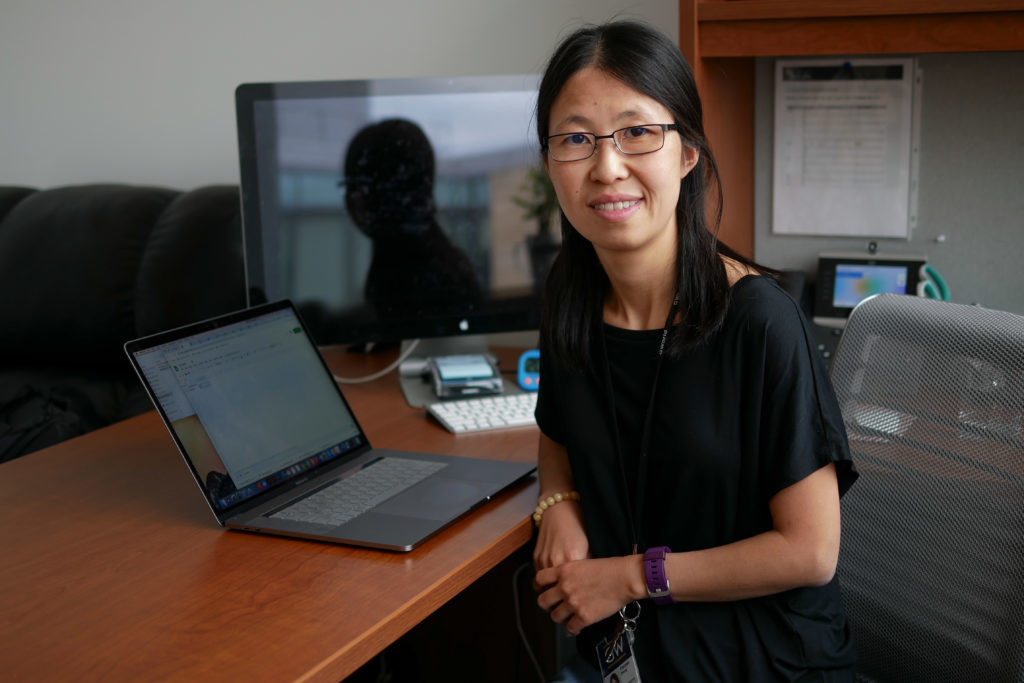A professor in the School of Medicine and Health Sciences completed an investigation earlier this month into how the pathways of cells may cause birth defects and some cancers.
Xiaoyan Zheng, a professor of anatomy and regenerative biology, found that a protein involved with the Hedgehog cell-signaling pathway – utilized in the cell differentiation process – can facilitate and interrupt communication between cells. Zheng said that investigating proteins the Hh cell pathway uses may allow researchers to discover more effective cancer treatments.
Zheng said she discovered that Ihog, a protein involved in the activation of the Hh cell pathway, mediates cell-to-cell interactions and that the pathway may directly regulate how cells communicate with one another. She said the Hh signaling pathway interferes with Ihog-mediated cell-to-cell interactions by competing for Ihog binding.
“In this study, we emphasized on this new function that mediate cellular interactions,” she said.
Zheng said cell growth initiated by Ihog can be benign or harmful depending on whether healthy or cancerous cells end up multiplying. She said researching the mechanisms behind how Ihog proteins work in the body is necessary for developing treatments for diseases caused by malfunctions in Hh signaling.
“There are always steps between basic discovery to treatment,” she said. “In my point of view, the more we understand this signal and its proteins, the more possibilities that we can treat it.”
Zheng began her research in 2013, applied for a grant from the National Institutes of Health and National Institute of General Medical Sciences in February 2015 and reapplied in March 2016. Zheng later received a $1.7 million grant to continue investigating treatments for the Hh cell signaling pathway.
Zheng said she will apply for an additional research grant to further study the potential effects of the newly discovered Ihog protein function on human health.
Experts said that fully understanding the mechanisms behind the cell pathway will allow medical researchers to develop treatments for diseases resulting from malfunctions in Hh cell signaling.
Robert Krauss – a professor of cell, developmental and regenerative biology and oncological sciences at the Icahn School of Medicine at Mount Sinai – said the Hedgehog pathway plays a crucial role in developing nearly all body tissues. He said the Hh pathway allows for normal embryo development and maintains adults’ homeostasis, or stable internal body conditions.
Health problems related to the Hh pathway can arise from an absence of cell signaling in embryos and too much signaling in adults, Krauss said.
Krauss said the loss of Hh signaling during embryonic development can lead to birth defects like holoprosencephaly, when the human brain fails to divide into two hemispheres, and polydactyly, when someone is born with extra fingers or toes.
“We still have a huge amount to learn about fundamental, biological processes, and in studying these fundamental processes, that’s where the drug treatments of tomorrow come up from,” Krauss said.
Ben Allen, a professor of cell and developmental biology at the University of Michigan, said that although Hh inhibiting pills can effectively treat cancer, existing Hh pathway-inhibiting medication cannot selectively treat afflicted body tissues because of the presence of Hh pathways throughout the body.
Allen said that existing Hh inhibiting medication can cause adverse side effects like hair loss and weakened sense of taste. Researchers are currently studying methods like cancer-treating creams, which target cancer-affected tissues, and treatments like mouthwashes that can counter the effect of Hh-inhibiting drugs on patients’ sense of taste, he added.
“It’s good news that there are drugs that can target this pathway,” he said. “The bad news is that we don’t have a good way to selectively target the pathway in certain tissues, but not others.”
Tannishtha Reya, a professor of pharmacology and medicine at the University of California, San Diego, said Hh pathway research allows medical researchers to develop cancer treatments like Hh pathway inhibiting medication.
Reya said over-activation of the Hh cell pathway produces excess cells, which can become cancerous. She said that common types of cancer resulting from over-activation of the Hh pathway include certain types of skin and blood cancers.
“The cells grow when they should not,” Reya said.
Ed Prestera contributed reporting.





